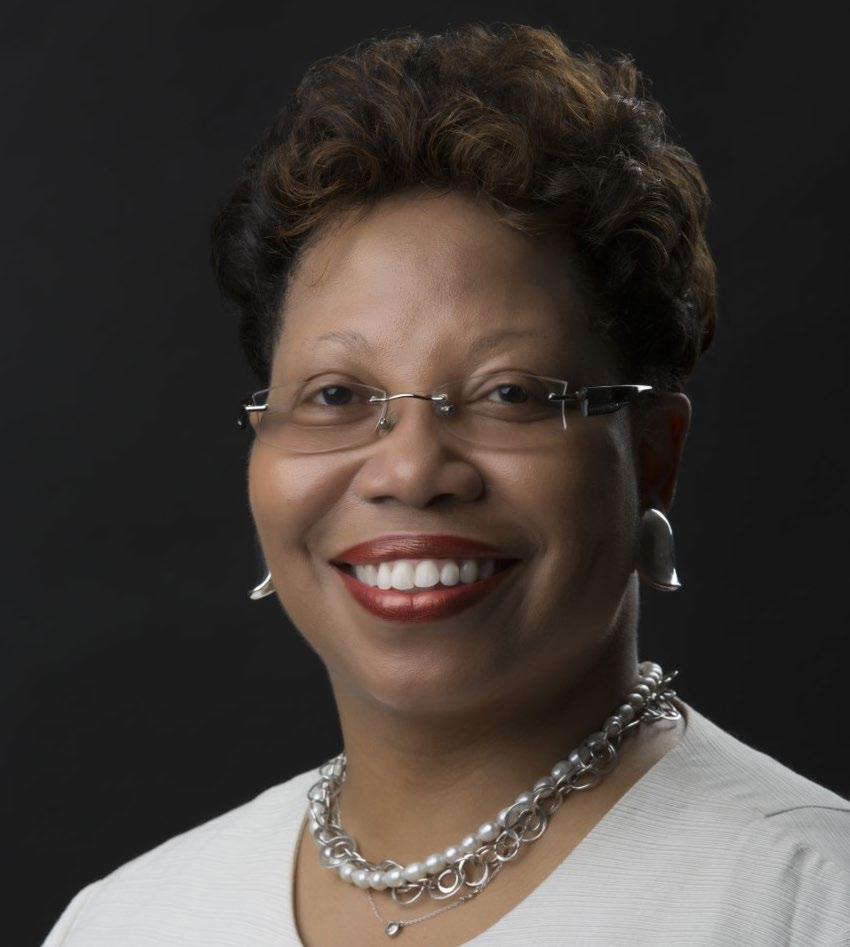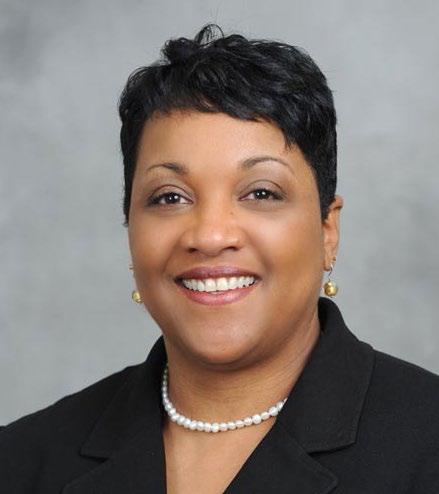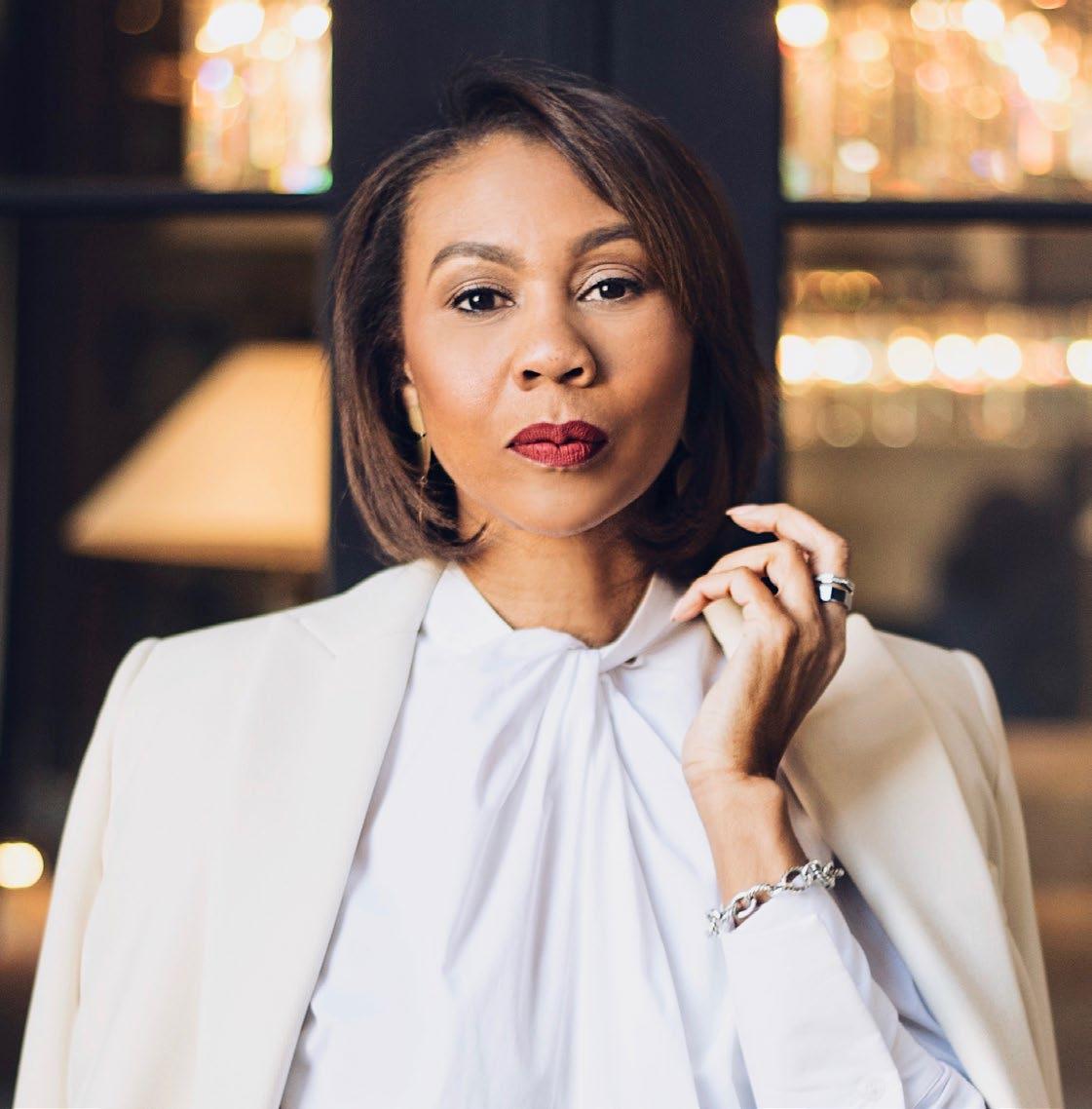
15 minute read
Session
SESSION #2 Disruption & Opportunities
Stephanie Barnes
Advertisement
Stephanie Barnes, CEO of The Fruition Group, LLC, is “a writer who moonlights as a corporate attorney” as she likes to say. Stephanie helps women create the life they desire and deserve. She shared her thoughts on disruptive elevation and how to get your train on the right track when life derails you, but the importance of causing disruptions to realize even greater success.
Stephanie started out asking participants a series of questions: Are you feeling stuck? Tired of being ordinary? Want to be the stand out? Ready to make the best half the best half? Want to make yourself a priority? Ready to go from broke to breakthrough? Want more but don’t know where to begin?
She then moved on to explain how to fully embrace the disruptions you face to move to a place where you can realize your full potential.
FIVE STEPS TO PIVOT FROM DISRUPTION TO DESTINY. to kill or cut off — so cut off Investment)? Or wasting resources/time?
STEP ONE: SURRENDER.
Make a commitment to give up what was and embrace the possibility of what can be.
STEP TWO:
Be Mindful and make a conscious decision to be aware of your thoughts, mindset, behaviors, and your surroundings (including people). “First, be aware that every thought creates a future,” Stephanie said. “Then, take actions, and surround yourself, with people that keep your business moving forward.”
STEP THREE: CREATE A VISION.
Translate your thoughts to action. Think about this: What is it you truly desire? Desire is a word that focuses on what it is you wish to bring forward. Write that out. Give it significance. That’s what creates the STEP FOUR: DECIDE.
At the heart of the word is the Latin suffix “-cide” which means all options and focus on the one that moves you forward. Everything you do has to connect you to your vision. “Knowledge without action is just trivia.” Here are five decision making questions to guide you: 1. What can I control right now? 2. What can I do right now? 3. What can I do regardless of my circumstances that has a ROI (Return On
vision. “What you see is what you’ll be.” 4. What do I need to do right now? 5. What would I be doing right now even if everything were going as I planned it?
Women need to be the CEO of their lives by putting in the W.O.R.K.: W: You can win by losing sometimes (loses can actually be releases). O: Own your issues and do something about them (we can’t control other people but we can control ourselves). R: Release, Refresh, Renew, Rejuvenate, Recommit and Rebound from relapse. K: Keep your focus on your destiny.
HOW DO YOU BALANCE THE RIGOR OF PLANNING AND BEING FLUID? You need to develop a bias towards action. There is no “right” time — there is “the” time and what you do with it. Yes, you need to plan and you need to reference your plan. But more importantly, you need to commit to moving. Waiting is not a wealth strategy. WHAT ARE TOOLS THAT YOU’D RECOMMEND IF WE GET STUCK? • Journaling: this is a great way to get your thoughts out of your head, privately.
Affirmation statements: For Stephanie, these are “I am … “ statements. Make them plain so that you can understand them and say them aloud to yourself.
Join mastermind/Accountability groups: you are powerful when you connect with likeminded people who share your dreams and your visions.
SUMMARY
Stephanie left participants with an analogy that leaves only one choice. Considering Netflix as a great example of disruptive innovation, offering a DVD-by-mail model that pushed the video rental business icon, Blockbuster, into bankruptcy, women have a choice to make. Will they be a Blockbuster, holding onto the past, or a Netflix, embracing disruption and evolving? The key to an entrepreneurial woman’s success is to both face and drive disruption in their marketing and business strategies.
Pamela Bivens


Glenda Stinson
SESSION #3 Cultural Competence & The Value Chain cultures. So we should strive to see human differences but take our armor off, let our guards down, let ourselves be vulnerable. “Our way of looking at others starts with ourselves.”
Pamela Bivens, Assistant Director for Diversity and Inclusion at Duke University and Glenda Stinson, Supplier Development Manager for Southern Company’s electric business affiliates (Georgia Power, Alabama Power and Mississippi Power), shared personal and operational perspectives on leadership, with a focus on diversity, inclusion and the value chain. Yolanda White introduced the speakers and started the conversation with one of her favorite quotes, from entrepreneur and business leader Ken Lear: “The essence of great leadership is influence, not authority.”
Bivens started out explaining that leadership involves soft skills and emotional intelligence. As leaders, we need to demonstrate human empathy & authenticity. We start by understanding our own implicit biases. These biases are part of our human evolution. Our brains are wired to see human difference, and we do so in 1/5th of a second. Complexion is one of the first things people see when they look at us. That leads to Colorism. Black people in some cultures are guilty of this, too; for example, in some cultures and in some families, there’s a distinction between people of color with lighter colored skin. Our hair also speaks volumes about who we are, and for some, who we must be. These biases We also need to build cultural awareness and cultural competence, which is significant to how we operate our businesses. When we focus on cross cultural skills, we enhance our emotional intelligence. Immigrants are adept at starting their own businesses. We must be mindful of what will matter to them so we can build a stronger network that includes them. We must work on biases so we can do business together. Values are overarching for a lot of different
signify the importance of the Crown Act. Stinson continued the conversation from stressing the importance of communicating the value of what we offer and the importance of being conscious of the culture of our customer base and how they perceive that value. Does it represent the value they are looking for (e.g., what is important to them, how they want to be treated). She went on to explain the importance of a Value Chain Analysis and how to use it to create efficiencies in our business processes that yield higher profitability for your business.
SUPPORT ACTIVITIES
Firm Infastructure
Management, finance, legal, planning
Human Resource Management
Professional development, employee relations, performance appraisals, recruiting, competitive wages, training programs.
Technology Development
Procurement
Inbound Logistics
• Real-time inboud inventory data • Location of distribution facilities • Trucks • Material
Handling • Warehouse Integrated suppy chain system, real-time sales information
Real-time inventory, Communication with suppliers, Purchase supplies and material
Operations
• Standardized model • Access to real-time sales and inventory systems
Outbound Logistics
• Order processing • Full delivery trucks
Marketing and Sales
• Pricing • Communication • Promotion • Products based on community needs • Low prices
Service
• Delivery • Installation • Repair • Greeters • Customer service focus
MARGIN
MARGIN
PRIMARY ACTIVITIES
Chart from book: Michael Porters Value Chain: Unlock Your Company’s Competitive Advantage (Management and Marketing).
As a leader, you have to communicate tough information/reprimand employees. How do you find the right balance in order to make sure you get the result you expect?
Strive to be perceived as an empathetic and authentic. Use body language: tilt your head, soften you voice, look people in the eye. Allow yourself to be vulnerable. “It is so important to say I see you,” said Glenda. Focus on the mission and goals of your business.
How do you assess your supply chain/analyze what you need to build upon? • A good read: Michael Porters Value Chain: • Reference the chart shared in the workshop
Unlock Your Company’s Competitive and evaluate each operational area one by
Advantage (Management and Marketing). one of your business.
On being culturally competent, we know that body language is very important. How do we learn more about this as we try to do international business?
Do research (e.g., using Google) on what is appropriate for business etiquette. Culture wizard (https://www.rw-3.com/) If traveling to another country, learn how to say thank you, you’re welcome, good morning, goodbye and where is the restroom in their language.
It’s hard to be super solid at everything. When and how do you go for help? Any rules of thumb or suggestions? • You should be looking everywhere, expanding your network, always. “THE CONSUMMATE LEADER IS ALWAYS LOOKING FOR HELP.” ~STINSON
Other Resources:
Verna Myers (VP, Inclusion Strategy at Netflix) videos on YouTube. For example:
Unconscious Bias: Creating a Culture of Inclusion
How to overcome our biases? Walk boldly towards them
SUMMARY
The session speakers ended the conversation with powerful quotes. First, Pam quoted legendary jazz musician John Coltrane, “One positive thought produces millions of positive vibrations.” Glenda, after acknowledging how appropriate Mr. Coltrane’s words of wisdom are for this audience, also reminded each participant: TRUST YOURSELF.
Lindsey Puckett

The session started with a presentation from Lindsey Puckett, Assistant Vice President, Business Banking at Fifth Third Bank. She provided attendees with tips for building an effective growth strategy.
“The best way to stay mindful of your goals,” Puckett explained, “Is to make sure you have a solid business plan.” A business plan is what keeps you on track with your goals and vision. You need to update it, refer back to it, and use it to make solid business decisions. Additionally, you need to understand your strengths and weaknesses. It is important for you to seek the assistance of Advisors who can provide you with solid business advice and direction. Businesses can benefit from the advice of a Certified Public Accountant (CPA), a Business Banker, an Attorney, Marketing Specialist and other professionals in key areas related to your business. Identify key roles that represent a gap in your business and
SESSION #4 Building a Growth Strategy
understand how advisors will provide you with advice to guide your business growth.
Furthermore, you should always have a mentor. Find someone who is where you want to be, who is good at all the things you want to be great at, and who can help guide you. Then, ask your mentor: How have you achieved what you’ve achieved and what challenges have you faced? If you are unable to secure a mentor, continue attending educational workshops, obtain business coaching and study valuable business information. It is also important for you to give back and consider serving as a mentor to other entrepreneurs that may need your assistance.
She further discussed strategies on how to “access to capital”. When business owners submit loan applications, there are five pieces of information lenders will consider.
THESE ARE THE 5 C’S OF CREDIT:
Character: What kind of character does the borrower have?
Collateral: If we lend money, where is it going, and how can we collect if the borrower cannot repay?
Capacity: What capacity does the borrower/ business have to repay these funds? What does their cash flow look like? Condition: What is going on in the business and the industry?
Capital: What kind of cash is available?
IS THERE A SIMPLE PLACE YOU’D DIRECT PEOPLE WHEN SEEKING INFORMATION?
Reach out to a business banker and build a relationship.
Seek the services of the Small Business Administration for loans and certifications.
SUMMARY
Lindsey reiterated the importance of staying on your path, having a business plan, and acquiring top experts even though they require dollars (e.g., a CPA, business banker and a lawyer). Lindsey offered the following closing thought to inspire each successful female entrepreneur in attendance: “Remember that millionaires came from the Great Depression. Be mindful of that. Having that business plan will guide you through the highs and the lows. Hold yourself accountable to it and keep it close to your chest.”
Yolanda White

Stella Ringer
SESSION #5 Re-imagining Your Business
The last session for the day was a final conversation hosted by Yolanda White. Joining the conversation was Stella Ringer, Senior National Sales and Marketing Executive with The Coca-Cola Company – a woman who, according to White, “owns
and walks in her authentic truth.”
The session was designed to get at the heart of what can make a woman successful: reimagining your business with innovation, which starts with thinking in a more innovative manner.
White explained that entrepreneurs exist at every single age. And while 35 – 44 yearolds are the most active entrepreneurs, those aged 45+ are viewed as more skillful and have a lower rate of failure.
“We have to embrace our age, skills, and knowledge,” said White, “and bring all that forward. We have to be open to learning, understanding new technology and adapting to changing business models as a way to re-imagine our businesses.” Stella joined the conversation with an interesting perspective on ageism and the impact on doing business.
WHAT DOES AGE MEAN TO YOU?
Ringer started out quoting a famous cliché that touches on an important mindset and a perspective we need to feel in our hearts. “Age ain’t nothing but a number,” she said. “I approach aging like I approach everything else,” said Stella. “I take the bull by the horn and I move with it. I stay energetic and confident. I know who I am as a person. So even though I’m on this age journey, I have even more clarity.” Stella shared with participants a story from her days working on the Sprite brand for the CocaCola company, a youthful brand that collaborated with an agency that doubted her credibility and ability to relate as an older woman.
“Don’t let that little person on your shoulder talk to you as if you aren’t in the know, or cool, or hip anymore,” she said. Instead, she built an advisory board to keep her informed and updated. She provided the audience with the following business pro-tips for everyone establishing wanting to seize their power at their age, whatever it may be: 1. Establish your own advisory board to keep you informed 2. Keep your advisory board it diverse with professional that will push you to think innovatively. 3. Branch out and learn. Read books (or listen to audiobooks) that help “turn the channels in your mind” – again, written by people that have a wealth of knowledge and represent different ages and diverse groups
Think Link a Monk by Jay Shetty
[https://www.amazon.com/Think-Like-Monk-Train-Purpose/dp/1982134488]
ARE THERE ANY TIPS YOU CAN GIVE WOMEN SO THEY, TOO, CAN AGE OUT LOUD? CHAPTER:
A lot of the volume of aging out loud comes down to owning your personal style. When it comes to style, remember it is a mindset. Fashion is all about trends and clothing. What is new and what is hot. But your style is who you are. So, pivot as you age (maybe lose the skinny jeans if they no longer fit you) but never lose your style. “Always be who you are,” said Stella. (For her, that’s classy and chic with a little edge.)
WHAT DO YOU DO WHEN YOU TRY YOUR HAND AT SOMETHING AND FAIL?
Yolanda kicked off this conversation by voicing her personal belief that failure is a part of life; it helps us grow, learn and helps you do better on your next project. “A little bit of being an Entrepreneur,“ said White, “is being okay with failure.” Stella went on to explain that some failures can be attributed to not listening to consumers, a key to marketing success. It’s important for you to connect with your consumer to build a one on one relationship to satisfy their desires. There of course is balance in listening to consumer insights and trusting your intuition.
WHAT DOES INNOVATION MEAN TO YOU?
White and Ringer agree, innovation involves thinking and approaching things differently. It has evolved from a formula and a skillset to something broader: a mindset. “It’s not that deep,” said Ringer. “I’m more confident and able to take more risks now
STELLA’S NEXT that I’m older.”
While Ringer is continuing to enjoy the success she’s found at The Coca-Cola company, she wants to change the narrative around aging. She’s seen that there is a significant amount of negativity in this space. She’s passionate about sharing the truth about aging out loud as she’s discovering it. “We need to live our best life now,” she said. “All I learned has made me who I am.” Women need to embrace their age, celebrate it and be liberated. Stella keeps a quote on her phone that guides and inspires her, from Comedian Steve Martin and the title of a book by Cal Newport: “Be so good
they can’t ignore you”
CLOSING: SMALL BUSINESS SUMMIT
Yolanda reiterated the richness of the day, as it covered every aspect of the business — starting and ending with what it means for female entrepreneurs as leaders, business owners, and professionals that are working to drive growth in their respective areas. The rich content shared by the speakers focused on the importance of politics, the value of embracing disruption, leadership (both what it means and how we can be effective at managing all aspects of our businesses) and a financial growth strategy. The final session on innovation and ageism was a powerful way to end the summit. The closing session featured Antoinette Ball, CEO of WEOP, expressing her gratitude to Yolanda White for moderating, the sponsors (ADP, Fifth Third Bank and Southern Company) and the speakers. She shared that this type of sharing is key to the future and what WEOP strives to have engaging discussions that help women entrepreneurs know where they are going, establish a clear vision for the future, and discuss the things that are beneficial to them and their businesses. Glenda Stinson and Tiffany McClinton, members of the board, also shared their appreciation for the content and the contributors, iterating how critical the content was and how WEOP is an organization that truly cares and advocates for the development of female entrepreneurs.
HOW YOU CAN HELP:
Visit WEOP.org to donate or become a member Follow @WEOPInc on Instagram or Facebook Share with others links to the the WEOP website, social media page

WEOP is an organization founded and led by women of color, that implements and offers programming which fosters the economic advancement of entrepreneurial women through education, resources and professional networking. WEOP provides women with a platform to connect, learn, and acquire a sense of power to build sustainable businesses.
STAY CONNECTED TO WEOP! visit www.weop.org and subscribe to monthly newsletters.






